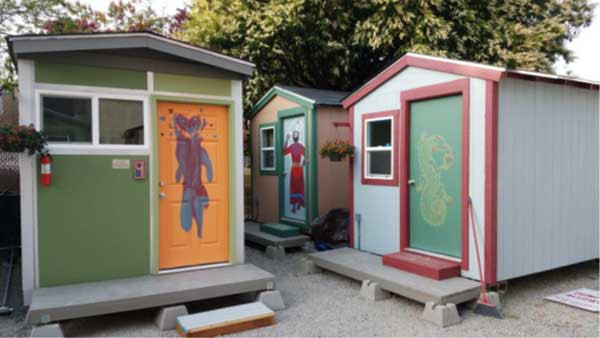
SEATTLE - Miami-Dade County officials are thinking about the possibility of using "tiny homes" as a short-term solution to house its homeless population who will be banned from camping in public places as of October 1.
The law signed by Gov. Ron DeSantis, prohibits cities and counties from allowing people to sleep in public places and allows local governments to create homeless camps if shelters reach capacity.
The law also allows residents, business owners or the attorney general to sue a local government for not following it.
Senator Jonathan Martin, R-Fort Myers, who sponsored the law, said the goal of House Bill 1365 is to provide safer locations for people than sleeping at places such as parks or under overpasses and pavilions.
"Insufficient shelter beds and insufficient permanent housing solutions result in unsheltered sleeping and camping in public places, places that we want our kids and grandkids to enjoy, like the parks," Martin said. "This bill is a compassionate response to the shortage of shelters and supportive housing by providing an alternative to sleeping in the streets."
According to the Miami Herald, a memo circulated earlier this month in which Miami-Dade Mayor Daniella Levine Cava's office highlighted the possibility to use the so-called "tiny homes" to help battle their homelessness problem and lessen pressure on the county's jails, as unsheltered homeless people could face jail time if found camping in public places.
Should Miami-Dade officials approve the implementation of the homes, the agency Homeless Trust would be in charge of managing the modular units.
Ron Book, chairman of the Homeless Trust, said the agency is prioritizing the acquisition of air-conditioned units with bathrooms, kitchens and living rooms. The agency is also considering a series of crisis housing options in order to avoid the construction of encampments.
"If you're going to build a tiny home project, it needs to be a real home," Book said. The county has entertained similar ideas in the past, though a proposal to build 100 such homes on Virginia Key ran aground in 2022 amid pushback from community members.
Miami-Dade officials consider the proposal of using tiny homes to help the county's homeless population is better than the alternative.
The state's camping ban permits counties to designate spaces for homeless encampments, but officials say they pose an inadequate solution. Levine Cava's office described them as "fraught with concerns" that include less-than-dignified standards of care, exclusion of certain people in need and the potential security risks associated with mixing disparate homeless households.
Other counties across the U.S. have opted for the use of tiny homes to provide shelter for their homeless populations.
In Virginia, the Kirkwood American Legion Memorial Post 156 partnered with the Veterans Community Project to build a village of tiny homes near the VA Hospital in North St. Louis City.
In Austin, nonprofit The Others One Foundation (TOOF) has added more than 100 tiny homes to the emergency shelter known as the Esperanza Community. The nonprofit plans to add 100 more units by March of 2025.
© 2024 Latin Times. All rights reserved. Do not reproduce without permission.












